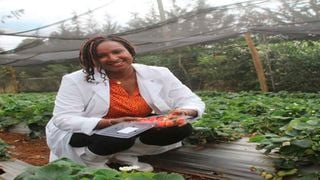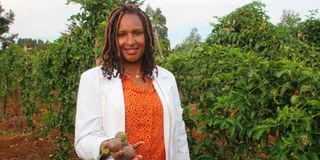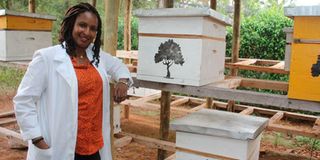
Judy Rono-Loretz, 41, a US-based nurse in her orchard farm in Plateau, Uasin Gishu County on February 27, 2021.
| Pool | Nation Media GroupSeeds of Gold
Premium
Telephone farming bridging the gap
What you need to know:
- She relies on platforms such as WhatsApp to communicate with her farm workers, as well as Facebook and YouTube to learn new farming practices
Highland orchard farm in Plateau, some 15 kilometres from Eldoret town, is a breath-taking scenery dotted with several crops. It is here that the Seed of Gold team meets Judy Rono-Loretz, 41, a US-based nurse on a short break trip to Kenya. The 41-year-old is growing a number of crops in two farms in Eldoret, Uasin Gishu County.
But her story is unique in the sense that despite being a nurse based in Minnesota, in the US, she has managed to successfully run her thriving horticultural farm.
“I grew up on a farm in Kitale town and I have always loved farming. I liked the fact that you are relaxed and there is calmness on the farm but I really wanted to plan for my retirement since I plan to relocate to Kenya in the near future,” says the farmer, who has stayed in the country since 1999.

Judy Rono-Loretz, 41, a US-based nurse in her orchard farm in Plateau, Uasin Gishu County on February 27, 2021.
On this farm, she has planted bananas, passion fruits, tree tomatoes, strawberries, avocados and grapes and has set up several bee-hives. On another half-an acre farm in Illula, she cultivates apples, kiwis and paw-paws.
For Judy, the beginning was hard and she says she first started by venturing into mushroom farming in 2014 and then poultry farming the following year, both of which failed .
“I had employed some workers to run the farm but they mismanaged it. I used to buy a lot of feeds but I realised I was not breaking even and that is how I called it quits,” recounts the mother of three.
In 2015, she would dispose the quarter piece of land in Kapseret and bought the two-and-a-half acres at plateau in Ainabkoi, where she currently farms.
In this farm, she has employed three workers who run the day-to-day operations at the farm while she is back in the US and occasionally, her father visits the farm to supervise.
She employs technology to run and monitor her farm as well as orders and engages her buyers using social media platforms such as WhatsApp and Facebook.
“We usually talk to the farm workers who share pictures and videos via WhatsApp every day,” notes Judy.
Market trends
She says that she learnt from other farmers in the US as well as via YouTube on the best crop practices and market trends.
“I usually visit farmers in the US and most of them are very hospitable and share information on their farm practices. In the US, I have set up a garden where I spend most of my free time,” observes the nursing graduate from Grand Canyon University.

Judy Rono-Loretz, 41, a US-based nurse in her banana farm in Plateau, Uasin Gishu County on February 27, 2021.
To grow the crops, Jeremy Limo, the farm manager, explains that they start by raising the seedling in nursery then use compost manure from dairy cows before mixing this top soils.
“We have raised the beds because they are prone to flooding. We also dig trenches to control flow of water and curb flooding from washing the crops,” he explains.
Profitable produce
On the farm, Judy has inter-cropped chillies with crops such as purple passion fruits and grapes to help control pests on the farm and increase her earnings. For avocados, they are spaced seven feet apart and two feet deep while tree tomatoes is three meters and two feet apart.
Most of her produce ends up in the markets in Eldoret town. For instance, strawberries are sold at bakeries and restaurants that make cakes. A punnet goes for between Sh100 and Sh150 while passion fruit prices fluctuate retailing between Sh70 and Sh100 per kilogramme.
“There is huge demand for the fruits in Eldoret town and other towns. We ensure that we get good quality produce for the market,” explains Limo.
Last year in July, she sold her first harvest of Hass avocados for the export market through Thika-based Biofarm fetching Sh100 per kilogramme.

Judy Rono-Loretz, 41, a US-based nurse in her farm in Plateau, Uasin Gishu County, on February 27, 2021.
She uses a drip line system to irrigate her crops. She has also sunk boreholes and put up two water tanks with 30,000 litres of water capacity. For one tank, she uses solar while another electricity to power water irrigation.
Last year, she brought some seeds and tried to introduce new crops grown in the US such as okra, cherry tomato cucumber, squash, coloured capsicum but most of them failed.
Some of the challenges include blight that affects tree tomatoes and passion fruits and birds that feed on the strawberries and bananas.
“Whenever our farm workers have a challenge, we get a county agriculture officer who regularly visits the farm to access the crops. We have the advantage since our workers have the requisite experience and academic qualifications,” says Judy.
Her advice to farmers in the diaspora who would like to engage in telephone farming: “First, you need to conduct a market survey before deciding to grow the crop. You also need to get honest workers because you need to entrust someone who will take care of the farm while you are away.”
Honest employees
Patrick Kalama, a crop expert at Kenya Agricultural Livestock and Research Organisation (Kalro) observes that telephone farming helps to save time and resources for farmers not physically available most of the time.
“The use of gadgets can help a farmer to run a farm. However, one must get the right farm workers to succeed such as honesty, trust-worthy and must ensure that they have the right experience,” adds the expert.





